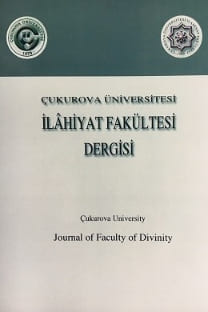Arapça Tefsir Tarihi Yazımında Başlangıç Mülahazaları: Kitabi Yaklaşım Tarihi
Şu ana kadar Arapça olan geniş ve kapsamlı bütün tefsir tarihi kitabiyatının yayınlanması nedeniyle bu çalışmaların tarih yazımı açısından analizi arzulanan bir husustur. Bu makalede ben üç ana tefsir tarihi yazımının varlığını tartışacağım: Geleneksel Eşarî, Selefi ve çağdaş (modernist). Şu ana kadar tefsir çalışmalarına nasıl yaklaşıldığını anlamayı arzu ediyorsak söz konusu grupların (taraftarları) tespiti elzemdir. Çünkü bu üç yaklaşımın savunucuları, bugün batı akademisinde sahanın gelişiminde temel alınan çok sayıda tefsiri tahkik edip basmış ve basmaya da devam etmektedirler. Makale bize, tefsirleri sınıflandırmada anahtar rolü olan ve tarihte her zaman var olan et-tefsîr bi l-mesûr teriminin tarihi gelişimini inceleme imkânı vere- cektir. İlaveten, tefsir tarihi yazımı, Arap dünyasında tahkik edilip basılan tefsirlerin tarihiyle birlikte tartışılarak burada ele alınacaktır. Başka bir ifadeyle, tefsir tarihi yazımında, tahkik edilip basılan tefsirlerin bizzat kendileri tarihi kilometre taşıdır ve benim aynı tarih yazımını anlamaya teşebbüsümün birincil anlama vasıtasıdır.
Preliminary Remarks on the Historiography of tafsir in Arabic: A History of the Book Approach
Since all the extensive histories of the tafsir genre published so far are in Arabic, a close analysis of the historiography of these works is a desideratum. In this article I will argue that there are three major categories of historiography, the traditional Ashcari, the Salafi, and the modernist. Identifying these camps is essential if we desire to understand the manner in which tafslr studies has been approached so far, since the proponents of all three have produced, and continue to produce, the editions of tafsir works that are the basis of most histories in Western academia. It will also allow us to investigate the history of the all-present term "al- tafsir bi al-mathur which has come to play a key role in the categorisation of tafasir. Charting the historiography of tafsir, moreover, is here undertaken in conjunction with discussion of the histo- ry of publications of editions of tafsir in the Arab world. In other words, a history of the editions themselves as eventful milestones in a historiog- raphy of tafsir is the primary means through which I attempt to under- stand this selfsame historiography
___
- Abdulâl, İsmail, İbn Kesîr ve menhecuhu fît-tefsîr (Kahire: Mektebetul-Mâlik Faysal, 1984). Abdulcebbâr, el-Kâdî, el-Muğnî fi ebvâbit-tevhîd vel-adl: icâzu l-Kurân, (tah) Emin el-Hûlî (Kahire: Darul-kütüb, 1960). el-Arabi, Amir b. Ali, el-İklîl fi istanbâtit-tenzîl (3 cilt), Cidde: Darul-Endelüsul-Hadra, 2002. Aşûr, Fâdıl b., et-Tefsîr ve Ricâluhu, (Tunus: Darul-Kütübüş-Şarkiyye, 1966). Bar-Asher, Meir, Scripture and Exegesis in Early Imami Shiism (Leiden: Brill, 1999) Birkeland, Harris, Old Muslim Opposition Against Interpretation of the Koran, Avhandlin- ger utgitt av der Norske Videnskaps-Akademi I Oslo. II Hist.-filos. Klasse. 1955, No. 1, ss.1-42. Dickinson, Eerik, The Development of Early Sunnite Hadith Criticism: The Taqdima of Ibn Abî Hâtim al-Râzî (240/854-327/938), (Leiden: Brill, 2001). El-Fihrisş-şâmil lit-türâsil-Arabîl-İslâmil-mahtût, ulûmul-Kurân: mahtutatul-tefsîr (12 cilt, Amman: Müessesatu Âl-i Beyt, 1987). Gazâlî, İhyâu Ulûmid-Dîn (Kahire: Matabaatul-Osmaniyye, 1933). Goldfeld, Isaiah, The Development of Theory on Quranic Exegesis in Islamic Scholars- hip, Studia Islamica, 67 (1988), ss. 5-27. Goldziher, Ignaz, Mezâhibul-İslâmiyye fi tefsîril-Kurân, Ecnats Culd Tisihr, (çev) Ali Ha- san Abdulkadîr (Kahire: Matabaatul-Ulum, 1363/1944). Goldziher, Ignaz, Die Richtungen der islamischen Koranauslegung (Leiden: Brill, 1970, 1920 baskısının yeni basımı). el-Hûlî, Emin, el-Amâlul-kâmile (10 cilt, Kahire: el-Hayyul-Mısriyyel-Amâ lil-Kitab, 1995). İbn Ebî Hâtim, Tefsîru İbn Ebî Hâtim, (tah) Ahmed ez-Zehrânî (2 cilt, Medine: Mektebetud- Dar, 1987). İbn Kesîr, el-Bidâye ven-nihâye, (tah) Abdullah et-Turkî (Kahire: Darul-Hicr, 1998). İbn Kesîr, Tefsîrul-Kurâni l-azîm, (tah) Abdulazîz Ğuneym vd. (Kahire: eş-Şab, 1971). İbn Teymiyye, Mukaddime fî usûlit-tefsîr, (tah) Adnân Zarzûr (Kuveyt: Darul-Kuranil- Kerim, 1971). Kholber, Etan- Mohammad Ali Amir-Moezzi (tah), Revelation and Falsification: the Kitab al-qiraat of Ahmad b. Muhammad al-Sayyari, Critical Edition with an Introduction and Note s (Leiden: Brill, 2009). Rufeyde, İbrahim, en-Nahv ve-kutubul-tefsîr (2 cild, Bingazi: basım yeri yok 1982). Saleh, Walid, Formation of the Classical Tafsir Tradition: The Quran Commentary of al- Thalabi (d. 427/1035), (Leiden: Brill, 2004). Saleh, Walid, The Last of the Nishpuri School of Tafsir: al-Wahidi (v. 468/1076) and His Significance in the History of Quranic Exegesis, Journal of the American Orien- tal Society 126 (2006), ss. 223-43. Saleh, Walid, Ibn Taymiyya and the Rise of Radical Hermeneutics: An Analysis of An Introduction to the Foundation of Quranic Exegesis, (ed) Shahab Ahmed ve Yossef Rapoport, Ibn Taymiyya and His Times (Oxford: Oxford University Press, 2010), ss. 123-62. Saleh, Walid, Marginalia and the Periphery: A Tunisian Modern Historian and the History of Quran Exegesis, Numen: International Review for the History of Religions, 58 (2011). Sands, Kristin Zahra, Sufi commentaries on the Quran in Classical Islam (London: Rout- ledge, 2006). Sıddık Han, Muhammed, Fethul-beyân fî makâsidil-Kurân (10 cilt, Kahire: Bulak, 1294/1877). Speight, R. Marston, The Function of hadith as Commentary on the Quran, as Seen in the Six Authoritative Collections, (ed) Andrew Rippin, Approaches to the History of the Interpretation of the Quran (Oxford: Oxford University Press, 1988). Suyûtî , ed-Durrul-mensûr, (tah) Abdullah b. Abdulmuhsin et-Turkî (25 cilt), Kahire: Mer- kez Hecr, 2003). el-Şevkânî, Fethul-kadîr (6 cilt), Beyrut: Daru İbn Kesîr, 1998. Taberî, İbn Cerîr, Câmiul-beyân an tevîli âyl-Kurân (30 cilt, Kahire: Mustafa el-Bâbi el- Halebi, 1968). et-Tûfî, el-Sakal-ğadabiyya fîl-reddi alâ munkiril-Arabiyye, (ed) Muhammed Fâdıl (Riyad: Mektebetül-Ubeykan, 1997). ez-Zehebî, Muhammed, el-Tefsîr vel-Mufessirûn, 4. Baskı (Kahire: Matbaatu Vehbe, 1989). Zurkânî, Menâhilul-irfân fî ulûmil-Kurân (Kahire: Daru İhyail-Kutubil-Arabiyye, 1953).
- ISSN: 1303-3670
- Yayın Aralığı: Yılda 2 Sayı
- Başlangıç: 2001
- Yayıncı: -
Sayıdaki Diğer Makaleler
Almanya'da Uygulanan İslam Din Dersi Hakkında Bir Değerlendirme (Kuzey Ren Westfalya Örneği)
Nehhâs'ın İʻrâbu'l-Kur'ân'ında Lahn Tartışmalarına Konu Olan Kırâatlerin Değerlendirilmesi
Alman Tarih Ders Kitabında Hz. Peygamber Dönemi
Ebû Bekr Ca'fer b. Muhammed el-Firyâbi (v. 301/913) ve Hadis İlmindeki Yer
Muhammed Abduh'un Âdem Kıssasına Yaklaşımı
İbn Ebi'l-İzz el-Hanefi ve Muhammed b. Ali es-Senûsî Örneğinde Kuzey Afrika'da İctihad Hareketleri
Marx Neden Haklıydı? (Terry Eagleton)
Bir Mücadele Adamı Hasan Basri Çantay'daki (1887- 1964) Vatan Sevgisinin Kur'ânî ve Nebevî Temelleri
Bir Mücadele Adamı Hasan Basri Çantay'daki (1887- 1964) Vatan Sevgisinin Kur'ânî ve Nebevî Temelleri
